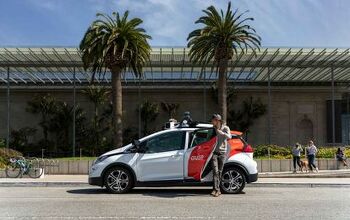Can A Robot Car Get You Pinched For DUI?

Sure, driverless cars might mean the end of individual freedom, automotive enthusiasm, and the American man as we know him today, but at least you can’t get busted for drunk driving when you let your robot car drive you home from the local watering home, right?
Right?
Writing in the New Scientist, legal expert Bryant Walker Smith suggests that it will be extremely possible to get a ticket for DUI in a self-driving automobile.
How do you ticket a robot? Who should pay? And can it play (or drive) by different rules of the road?… To what standard, then, should these vehicles be held? Must they perform as well as a perfect human driver for any conceivable manoeuvre? Or must they perform merely as well as an average human in a statistical sense? In any case, how should that performance be measured?
The first question Smith asks — how do you ticket a robot — is particularly interesting, because the current ticketing-industrial complex depends on aggressive ticketing to cover everything from municipal slush funds to red-light-camera firms’ stockholder dividends. A country filled with perfectly-behaved robot cars doing 54.5 miles per hour in a 55 and stopping right before the line at every traffic light will leave a lot of pockets empty. Something will have to be done, and that something will likely include paying some serious attention to what the occupants of driverless cars are doing. What if it turns out to be illegal to be “distracted” while one’s robot car is driving? If you want a vision of the future, imagine a thoroughly bored man staring out a robot car windshield — forever.

More by Jack Baruth


































Comments
Join the conversation
I'm almost positive that Michael would let KITT drive after he'd been drugged or beaten or otherwise rendered unable to drive. Apparently the Foundation for Law and government had different rules.
Thanks to autonomous cars, in the future one can read a newspaper, watch a movie, eat breakfast or take a nap while they reach their destination. We have that now. Its called public transportation!
"Do you mean to tell us that you think it is a bad idea for vehicles that are fully autonomous to be inspected to ensure they are working properly, even after years and many thousands of miles of use?" No. I expect the automotive equivalent of the Federal Aviation Administration will be created to regulate autonomous road vehicles. That entity will probably license independent vehicle inspection stations, much like the FAA licenses aircraft overhaul and maintenance facilities. In any case, local, state, and federal governments will get their cut of licensing and inspection fees.
This is a no brainier. The efficiencies gained in a productive mobile workforce will rule the day. Our concept of a work vehicle will migrate to a mobile office (or living room for that matter). It does beg the question on occupant safety though if we are all in recliners watching the big screen and jamming down the interstate at 70.